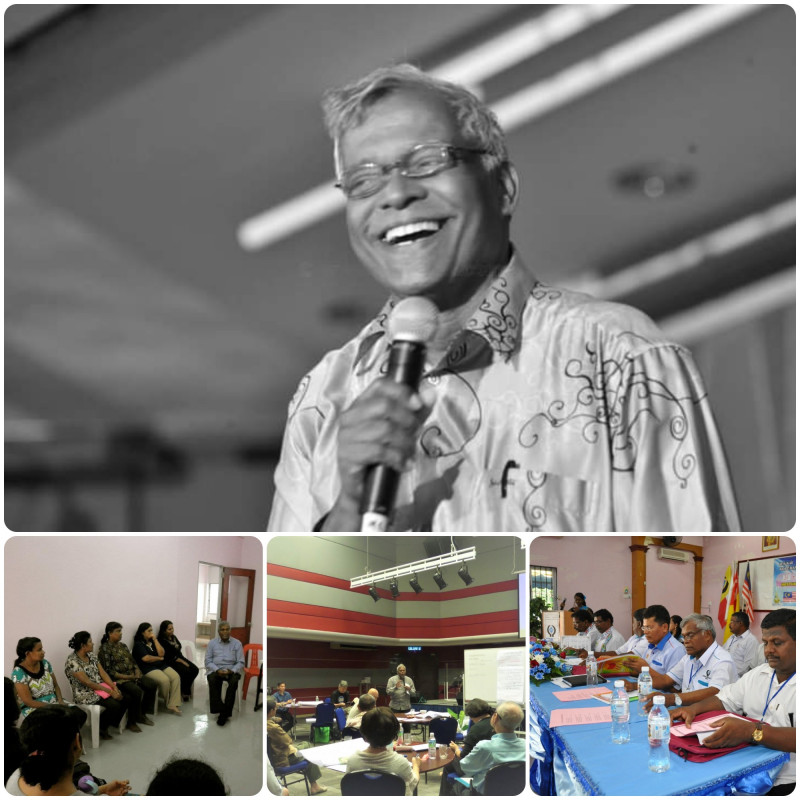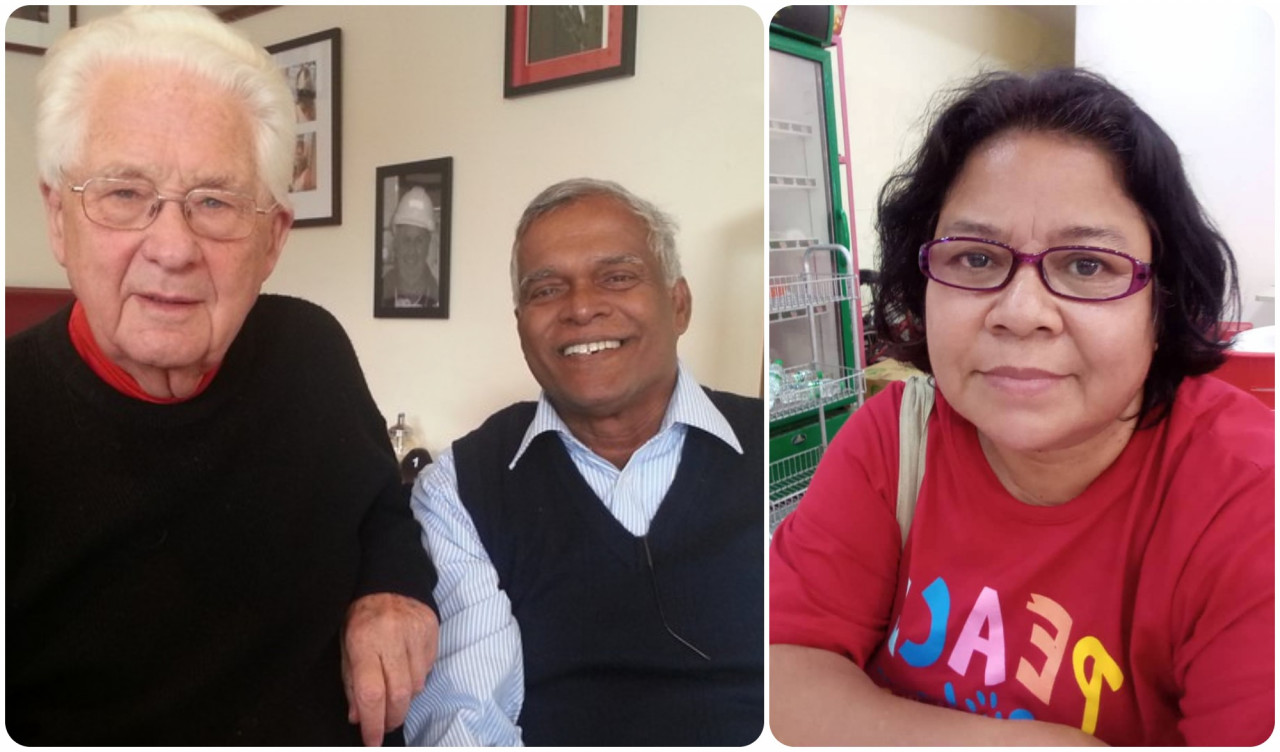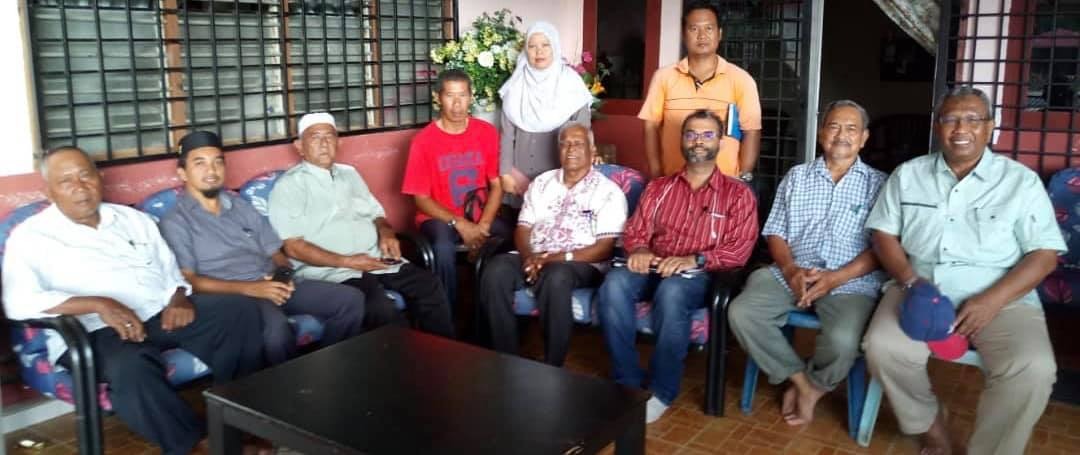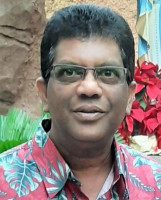There are too few that will commit themselves to defend and promote human rights and justice for others... Malaysia's Paul Sinnappan was such a man - but alas the state failed to even make him a 'Datuk' or 'Datuk Seri'(titles conferred by the King or Rulers as recognition of their contributions to society) - Looking around today, one wonders how many got such titles...
Well, Paul Sinnappan did not care about gratification or acknowledgement - he did what he did because he considered that was a duty, a responsibility and/or an obligation of every good person ...
Multi-ethnic communities saddened by ‘Barefoot Cooperator’ Paul Sinnappan’s passing
In life, he was a simple grassroots man, in death hailed a ‘Towering Malaysian’ for not just feeding the poor, but also teaching them how to fish
Updated 5 days ago · Published on 27 May 2021 3:00PM ·

"EVERY man's life ends the same way. It is only the details of how he lived and earned his stripes that distinguish one man from another". These are the words of journalist and author Ernest Hemingway.
On the headstone of the late Paul Sinnappan,
there will be inevitable letters and numbers cast in stone to mark his
final resting place at the Meru Christian cemetery in Klang.
His
epitaph will carry his name, the year of his birth, the year of his
passing as well as a comforting one-line inspiration from scripture.
But everything else about Sinnappan will be invisibly etched in the most indelible punctuation mark between the year of his birth and the year of his passing.
The very telling "hyphen" between 1950, the year Sinnappan was born and 2021, the year he died is what Hemingway defines as the “details”.
Details of Sinnappan’s life was immediately flashed on social media when he died on Monday at his Bestari Jaya home in Kuala Selangor. His son Arul Prakkash, in announcing his father’s passing, delivered this brief eulogy: “With great sadness, we announce the loss of our beloved father, Paul Sinnappan. He was a well-known social activist, defender of human rights, community builder and pioneer of ‘the’ micro-credit system for the poor.
“His work spread across the globe. He’s my inspiration to continuing the struggle for the poor, marginalised and to fight oppression everywhere. I believe he touched and inspired many others, too.”
Another significant detail about Sinnappan comes from Lawrence John, former director of Kuala Lumpur Archdiocese Catholic Social Communications Centre and present Signis International vice-president.
“Sinnappan earned his moniker Barefoot Cooperator for discarding his footwear whenever he walked to the kampung, plantations and Orang Asli settlements on his missions. It was a symbolic gesture of his, to be in solidarity with the poor, who accompanied him without sandals on their feet,” says John.
‘Terima kasih kerana berjuang bersama’
The following detail by an Orang Asal (OA) community leader Tijah Chopil who spoke to The Vibes when contacted by phone is best retained here in Bahasa Malaysia, the language she spoke – as Sinnappan himself perceived himself as Malaysian first and had excelled in the national language whenever engaging with the Orang Asal and the Malay communities.
“Saat ini moga roh mu telah berada disisi Bapa yg disyurga berehat dengan tenang. Terima kasih kerana anda telah menjadi seorang yang sangat berjasa kepada anak-anak Allah di dunia.
“Terima kasih kerana telah menjadi sahabat dalam perjuangan untuk membawa keadilan dan kegembiraan buat masyarakat2 miskin termasuk Orang Asli. Sebagai seorang sahabat dalam perjuangan ini bagi mewakili Masyarakat OA yg pernah anda bantu dan berganding bahu saya mengucapkan ribuan Terima Kasih yang tidak terhingga.
“Saudara seorang yang sangat humble, sabar dan selalu sedia membantu. Dia sangat bijak dan tidak kedekut berkongsi pengalaman dan pengetahuan nya. Dia selalu mahu membantu dan mahu melihat orang-orang miskin dan susah atau tertindas dari segi ekonomi dapat bangkit dan membina hidup mereka dengan mengamalkan satu sistem hidup yg lebih teratur.
“Saya secara peribadi banyak belajar dari Paul. “Kami sangat merasa kehilangan anda tetapi semangat dan segala jasa baik anda tetap abadi di dalam jiwa kami. Berehat lah dengan tenang sahabat disisi Allah Bapa. Amin!”

Towering Malaysian
Klang MP Charles Santiago lends this detail: “Sinnappan was simply, a grassroots man to many local communities in the Malay kampongs, Orang Asli villages and poverty-ridden Tamil labourers in the plantations and in fact, to the larger world. Ask anybody and you will get the same things spoken about Sinnappan.
“Everybody will highlight Sinnappan’s poverty-defying micro-credit system. It allowed the poor to rise above the oppressive capitalistic-economic structures that kept them grovelling at the mercy of sycophantic middlemen.”
Santiago said Sinnappan fundamentally started cooperatives that helped the marginalised gravitate away from middlemen and money lenders and from being entrapped almost permanently under their clutches.
“Sinnappan’s name is synonymous with initiatives such as the formation of families, communities and workers. Sinnappan had a way of teaching basic social-economic systems even to the most uninitiated and illiterate people of the poorer strata, living in the fringes. He did not put away this sector of people on the backburner as ‘unteachable’ but persevered to empower them tirelessly.”
According to Santiago, Sinnappan always had
an inclusive attitude. He saw it fit to teach everyone including single
mothers on how to analyse social-economic trends, as a way of rising
above their mundane state of socio-economic ordinariness.
And he did
it through many creative mediums, using simple and fun-inducing teaching
aids to animate ideas in his impromptu classrooms.
Understanding ‘reality and rights’
Malaysian Human Rights Advocate and Activist, Charles Hector Fernandez, “details” Sinnappan simply as “a good man” in an FB post.
“Sinnappan was a human rights defender, community organiser, credit unionist and a lay theologian. As a devout Roman Catholic, he was a person who was not simply religious, but one who put his faith into action.
“Hailing from a rubber estate community, where life was tough, where poverty and sickness existed, Sinnappan's significant turning point was when, at 15 years old, he joined the Young Christian Students (YCS) movement. Sinnappan did not classify people into ethnic groups, religious groupings or castes, though he selectively ‘advocated’ an option for the poor.”
Fernandez said Sinnappan was involved in community organising, aiming to bring people together, build awareness of their reality and rights, and thereafter act towards improving their lives and rights.
He worked with plantation workers, squatter communities, small scale farmers, the Orang Asli community, the urban poor and even “small businesses” people.
“Sinnappan was also actively involved in credit unions which are non-profit co-operatives that provide financial services to their members, by linking savers and borrowers in the same community.”
According to Fernandez, credit unions pool the funds of members to provide capital and do not rely on external funding. For the poor, credit unions (or Credit Cooperatives) enables members to have higher returns on their savings and lower interest rates for their loans, as well as fewer fees to pay.
Fernandez pointed out the members themselves administer and manage these credit unions, including making decisions on loan applications and investment. In 2013, there were more than 500 organised credit unions, with a membership of 49,079, and children’s membership of 34,000, with a total profit of about RM4.5 million. Sinnappan was also a founder member of the Credit Union Promotion Club (CUPC) established in the 1970s and registered in 1974.
In the early 80s, Sinnappan was attached to the National Office for Human Development (NOHD), which was the Justice and Peace office of the Peninsular Malaysia Catholic Church.

Fear of ISA detention
“From basic caring and mere praying, Sinnappan was instrumental in the work of the Church in advancing and challenging Malaysian Catholic communities to understand the need to promote and defend political, economic and socio-cultural rights, including also workers' and human rights.
“He was involved in ‘awareness building’ of the social teachings of the Church, and also the Lenten Campaigns. In 1987, during Operation Lallang, the then deputy director of the NOHD and a former staff of NOHD were also arrested under the Internal Security Act (ISA).
“Despite the risk and fear of being picked up by the Special Branch as an NOHD staff, Paul courageously endured and continued to work for justice and human rights. His person, and also his talks and training have been an inspiration to so many and has certainly increased the number of Malaysians who are committed to the defence and promotion of rights” adds Fernandez.
‘A full-package man’
According to Parti Sosialis Malaysia (PSM) vice-chairman S. Arutchelvan, Sinnappan always went the full distance whenever he reached out to communities.
“There were no half-measures with him. It was 'full-package' all the time as he went about serving the community wearing many hats, as a teacher, trainer, activist. He empowered people through his talks, the speeches he made, the plays he wrote and through his writings. Paul was always that reservoir of knowledge,” says Arutchelvan.
‘Leadership not the leader’
When contacted, PSM Central Committee Member Rani Rasiah said: “Sinnappan was like ‘essential reading’ for aspiring community organisers. Especially at a time, in the 80s when the social activism landscape was muted and quite barren of social movements and resistance activity, unlike now.
“Sinnappan opened up the world of organising to novices like us then. He stressed the importance of leadership, not the leader, and leadership values such as humility and respect for the people we were organising.
“He taught us about enabling and empowering oppressed people. He introduced us to his self-devised teaching aids such as ‘blue tack’, ‘mahjong paper’ and ‘group dynamics’. His sessions were fun, yet meant to inspire as an alternative to the culture of poverty. We learnt from his humaneness,” she adds.
She detailed Sinnappan as one who spoke of and practised gender equality, not just during formation sessions but even at home.
“In all his sessions, he smashed myths we had grown up with. Like caste and class – giving the historical perspectives to it – and showing how the ruling classes used religion and the mass media to perpetuate such beliefs.
‘Pencil and eraser’
In a media statement, Kuala Lumpur Archbishop Most Rev Julian Leow, detailed the pastoral virtues and services that Sinnappan had offered to the many marginalised groups. They were plantation workers, the Orang Asli Community, the rural and urban poor and those who had difficult times managing their “small” businesses.
The prelate noted that Sinnappan’s involvement in credit cooperatives began in his teens as he was being mentored by Fr Yves Caroff, an Oblate missionary from France.
“Sinnappan then went on to introduce and promote these initiatives among the children of impoverished Tamil plantation workers by starting a credit co-operative which loaned money for items such as a pencil or eraser,” said Leow.
“This initiative subsequently grew into a network of community-based credit co-operatives benefitting homes, health, education and savings for over 64,000 families. The Malaysian Bishops supported the development of this model among the non-Christians and indigenous communities,” Leow added.
The prelate said: “Eventually, Sinnappan's ‘pencil and eraser micro-credit economic model’ grew in popularity and he was engaged by NGOs to teach this model around Southeast, East and Central Asia as well as in India and the United States of America.”
Sinnappan leaves behind his wife Rebecca, sons Arul Selvan, Arul Prakkash, daughter Arul Nithya and a host of relatives and friends.
The life of Sinnappan has come to a blissful conclusion. The lyrics have been sung, the song has ended, now only the melody lingers on, of Sinnappan who had taught Malaysians the first dynamics of “Kita-jaga-Kita”. In life, Sinnappan never earned the state honorifics, in death, just the eulogist’s applause. Thank you, Paul. – The Vibes, May 27, 2021








No comments:
Post a Comment